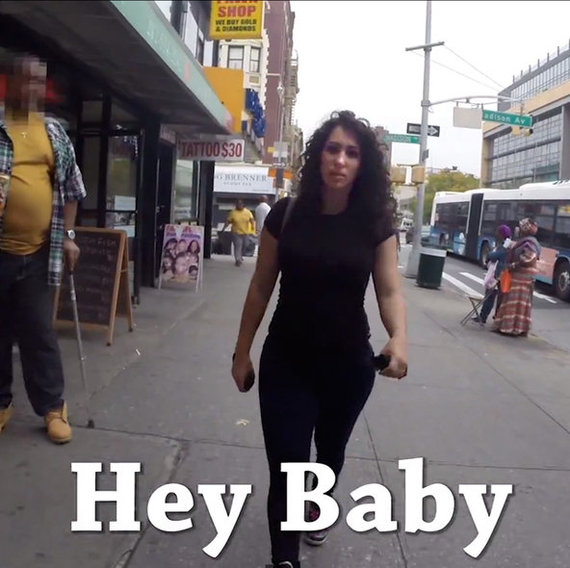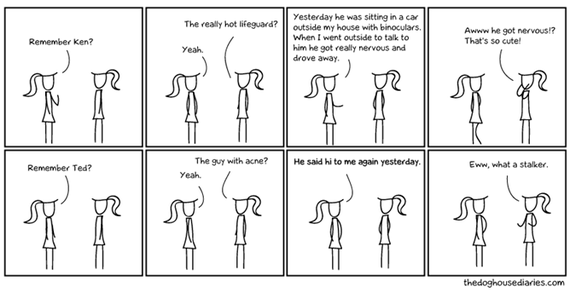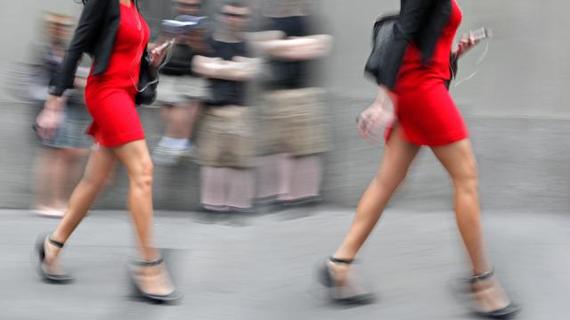
This week a video titled "10 Hours of Walking in NYC as a Woman" went viral on YouTube. Produced by Hollaback and intended to showcase street harassment, the video allegedly shows actress Shoshana B. Roberts encountering over 100 instances of harassment in 10 hours.
The video has struck a chord with many in New York City and around the world. Indeed, it showcases several instances of harassment: such as when a man comments on the logo on the back of Shoshana's jeans, or when she is asked to smile, or be flattered she was being acknowledged for her appearance -- as though looking pleasing is the most valuable thing about a woman. There was also the guy who greeted her briefly and walked beside her silently for five whole minutes -- although it's possible he was just headed in the same direction. The video lead to a slew of disturbing, sexist comments on YouTube, including rape threats directed at the actress, a sexual assault survivor.
The video has come under fire for the representation of these alleged harassers. Nearly all the men featured were black or Hispanic -- a choice on part of the filmmakers despite their claim that in real life, the harassers included men of all ethnicities.
Much of the "harassment" takes the form of greetings like "hello," "how are you," "have a nice day" and "God bless you." This is no accident. Since the decision was to curate two minutes from over 10 hours of footage, one can only assume the filmmakers included the same because they consider such greetings and pleasantries harassment.
The thing is, these pleasantries from strangers are hardly uncommon in NYC: from the random person on the subway, the cashier at Duane Reade, someone at the bar who is trying to strike up a conversation. Why should it feel like harassment coming from a stranger on the street? In the case of this video, it seems to be not the greetings themselves, but the identity of the greeter that's the source of discomfort.
As Ayesha Siddiqui pointed out: "A white woman filming and shaming black men for saying hi to her... are you sure your gender equality doesn't look a lot like class+race anxiety."
To the people who consider the likes of a "hello" to be harassment: Would it still be harassment if the strangers acknowledging your presence were people whom you felt good associating and/or identifying with? If they were not ethnic minorities, if they were not working class, if they wealthy and groomed to your liking and generally privileged? If you found them attractive or felt flattered by the attention? (And I use the term "attraction" loosely both here and in the title of this article.) Could it be that it only feels like harassment when the men acknowledging you were from invisible factions of the population whom you wanted to keep that way?
Author Joyce Carol Oates tweeted: "Isn't harassment of women walking alone in urban areas (as men do freely and without incident) -- a matter of neighborhoods? In NYC, certainly." And "Would be very surprised if women walking alone were harassed in affluent midtown NYC (Fifth Ave., Park Ave.), Washington Square Park etc." A classist argument if there ever was one. Anyone who has been around NYC would know that there's as much harassment in affluent affluent areas as in less affluent neighborhoods. Many tweeted to Oates to the effect, sharing their personal experiences. Wolves clothed in Armani are no less dangerous. Wealthy and well-educated scoundrels are still scoundrels. White collar harassment is still harassment.
I've lived in Manhattan for over a year now, having moved here from India. I am not a stranger to street harassment, expect that it seems to take different forms in different geographies. In parts of South Asia street harassment is often referred to as "eve teasing" and is more overtly hostile in nature. So in my first few weeks in NYC, I scarcely interpreted the hellos and godblessyous or even the seemingly friendly catcalls as harassment. The friendly and the playful simply didn't fit my idea of harassment. I'd smile, reciprocate greetings and respond to comments that ranged from positive to benevolently sexist. Most of the time, people really were just trying to be friendly and it ended there. Since realizing that my engagement might sometimes be interpreted as flirting, I've became a bit more cautious and curt.
Objectification need not be sexism need not be harassment; none of it is OK. Street harassment isn't a minor annoyance for it is symptomatic of a wider culture of violence against women -- and disproportionately affects women of color and LGBTQ individuals. It's not OK that the burden of protecting oneself from such harassment fall on the woman. Strangers who comment on a woman's body, even they mean to be flattering, are not OK. Guys who tell me to smile because they think my smiling face exists for the purpose of adding to the city scenery are not OK.
But guys issuing a simple greeting and leaving it at that? Those guys and those greetings really are OK.
It's toxic to look at the whole world through the framework of power imbalances and assume that every man who says hello has ill intent -- to make you uncomfortable or get in your pants. It's OK to accept and acknowledge a sincere greeting or positive gesture from human beings who are different from you.
Indeed, several studies have shown that causal everyday interactions with strangers or "weak ties" are as important our happiness and well-being as interactions with those with whom we have strong ties. Being acknowledged through eye contact and greetings are central to our basic human need to feel included, connected and visible to our fellow human beings. These simple acknowledgements make people feel included and happy while the prologned lack of the same is detrimental to physical and psychological health. Those YouTube comments that beseeched the actress to think about people on the other end of the spectrum -- people who were being severely bullied or rendered excluded and invisible- might have been on to something.
Sure, everyone has those days when they're not feeling social or are just trying to get somewhere and even a simple hello can seem like an exhausting intrusion. However, strangers on the street do have the right to say hello to you, and you have the right to ignore them if you so desire.
Street harassment and gender-based violence are real and serious. They should be recognized and called out for what they are. However, to accuse men of harassment just because you don't want to associate with them for whatever reason is a gross trivialization of actual harassment. It's also an unkind abuse of your privilege of human visibility.


